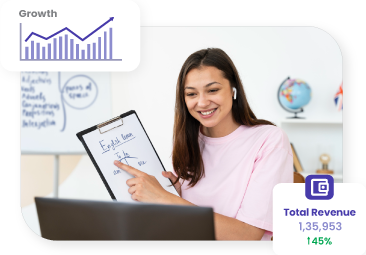The business environment today is fast and evolving. Organizations are increasingly adopting HR Learning Management Systems (HR LMS) to cope with these rapid changes. An HR LMS is a unified platform that ensures employees have consistent access to learning resources. This centralized approach simplifies administrative tasks and enhances the overall efficiency of training processes.
According to Horizon Grand View Research, the global learning management system market size was valued at $24.05 billion in 2024. Further, it is expected to grow at a CAGR of 19.9% from 2025 to 2030. This rapid growth is driven by the increasing demand for e-learning platforms across corporate, academic, and individual segments.
Businesses have started to invest in HR LMS solutions to support remote training and employee skill development, especially as hybrid work models dominate. Let’s dive deeper into how an HR LMS can benefit your organization and transform the way you manage training programs.
Why Do Organizations Need an HR LMS?

HR teams have always juggled numerous responsibilities; today, the stakes are even higher. They’re not just managing administrative tasks—they’re also tasked with meeting employees’ growing training needs and workplace expectations to boost engagement and productivity. Reskilling and upskilling have become critical for businesses aiming to stay competitive.
Implementing an HR LMS enhances the efficiency of training programs and contributes to a culture of continuous learning and development within the organization.
Key aspects of an HR LMS include the following:
- Centralized Training Management: Consolidates all training materials and records in one location, simplifying access and management.
- Automated Tracking and Reporting: Monitors employee progress and performance, providing analytics to identify areas for improvement.
- Flexible Learning Options: Supports various learning formats, including self-paced and instructor-led courses, catering to diverse learning preferences.
- Compliance Management: Ensures all employees complete mandatory training, aiding in adherence to industry regulations and standards.
Also Read: Exly Offers Online Creators New Ways To Earn
Now that we understand an HR LMS and how it simplifies training management, let’s explore the specific ways it benefits organizations.
How an HR LMS Benefits Organizations?

An HR Learning Management System (HR LMS) is more than just a training platform—it’s a tool that drives organizational growth. It empowers businesses to build a skilled, collaborative, and future-ready workforce. Here’s how it can enhance the growth of your business:
1. Streamlines Training Processes and Drives Efficiency
An HR LMS acts like an ecosystem that consolidates all training materials, schedules, and progress tracking into one system. This eliminates the inefficiencies of managing multiple tools or manual processes.
- Automation: Automates repetitive tasks like assigning courses, sending reminders, and generating reports.
- Real-Time Monitoring: Allows HR teams to track employee progress and completion rates in real-time, ensuring no one falls behind.
- Accessibility: Makes training content accessible anytime, anywhere, empowering employees to learn at their own pace.
2. Enhances Employee Engagement and Development
A well-implemented HR LMS motivates employees by offering diverse and interactive learning experiences.
- Personalized Learning: Tailors training paths based on employee roles, skills, and career goals, making learning relevant and engaging.
- Interactive Content: Features like quizzes, gamified modules, and videos ensure employees stay interested and retain knowledge better.
- Continuous Growth: Encourages professional development by enabling employees to acquire new skills and stay updated with industry trends.
3. Ensures Compliance with Up-to-Date Standardized Training
Meeting industry regulations and compliance standards is crucial for avoiding penalties and maintaining trust.
- Compliance Tracking: Automatically tracks training completion to ensure employees meet required certifications and deadlines.
- Standardized Content: Provides consistent, up-to-date training materials that align with industry standards.
- Audit-Ready: Keeps detailed training records that are easily accessible during compliance audits or inspections.
4. Fosters Collaboration and Knowledge Sharing
An HR LMS promotes a culture of learning and collaboration, which can significantly enhance workplace productivity.
- Discussion Boards: Enables employees to share insights and best practices with peers through forums and chat features.
- Team-Based Learning: Encourages group projects and peer-to-peer training sessions for collaborative skill-building.
- Knowledge Retention: Creates a shared resource repository, allowing employees to access institutional knowledge anytime.
Now that we’ve explored the benefits of an HR LMS, it’s important to understand what makes these systems so effective. Let’s look at the essential features and how they contribute to seamless training and development.
Essential Features of HR LMS Systems
An HR LMS ensures employees access relevant, high-quality learning experiences while HR teams can efficiently manage and monitor progress. Here’s a closer look at the must-have features:
1. Course Creation and Structured Learning Modules
HR LMS platforms provide tools to design and deliver engaging courses tailored to specific roles or skills. Structured learning modules ensure employees progress in a logical sequence, covering all necessary topics effectively. Features like drag-and-drop editors and templates make course creation quick and hassle-free, even for non-technical users.
2. Learning Material Repository for Easy Access
A centralized repository stores all training materials—presentations, videos, e-books, and guides—in one location. This allows employees to access learning resources anytime, from anywhere. It ensures consistency in training content and reduces the time spent searching for scattered materials.
3. Employee Self-Enrollment for Personalized Learning Paths
Self-enrollment options empower employees to take control of their learning journey. Employees stay motivated and engaged by choosing courses aligned with their career goals. Personalized learning paths foster a sense of ownership and ensure that the training is relevant to individual needs.
4. Assessment, Tracking, and Certification Management
Assessment tools like quizzes, assignments, and skill tests help employees understand and progress. Automated tracking ensures HR teams can monitor completion rates and identify gaps in training. Certification management motivates employees by recognizing their achievements, boosting morale and retention.
Exly’s comprehensive course creation tools provide powerful tools for creating and customizing courses. This can help HR teams to tailor training programs to meet specific organizational needs and learning objectives.
Also Read: Leveraging Authenticity for Brand Growth: The Rise of Micro-Influencers
Integrating existing HR systems is essential to maximizing an HR LMS’s potential. Let’s explore the key benefits of this integration.
Integrating LMS with HR Systems
Integrating a Learning Management System (LMS) with existing HR systems creates a seamless workflow that enhances organizational efficiency. This integration ensures that employee training and development align with broader HR functions. Here’s how it benefits organizations in detail:
1. Facilitates Employee Engagement and Upskilling
When an LMS integrates with HR systems, it creates a more cohesive and engaging learning experience. Employees can access personalized learning paths directly tied to their roles, performance goals, or career progression plans.
This alignment encourages active participation in training programs, making it easier for employees to acquire new skills and remain motivated. Additionally, integration with performance management systems helps identify skill gaps, ensuring targeted upskilling opportunities.
2. Supports Data Organization, Consistency, and Comprehensive Reporting
An integrated system consolidates all training and HR data into a single platform. This improves data consistency and reduces errors caused by manual data entry or managing multiple systems. With comprehensive reporting capabilities, HR teams can track training completion, performance metrics, and employee progress across departments.
This organized data allows for informed decision-making and highlights areas for improvement in training strategies.
3. Ensures Regulatory and Compliance Adherence
Integration ensures that compliance-related training is seamlessly tracked and recorded alongside other HR metrics. Setting automated alerts and reminders can ensure employees complete mandatory training before deadlines.
Detailed audit trails make it easy for organizations to demonstrate compliance during inspections, reducing the risk of penalties and ensuring adherence to industry regulations.
Exly offers multiple business operating tools, eliminating the need to manage multiple subscriptions and manual data integrations. Easily integrate EXLY with your website and connect the products you love in a few clicks.

Choosing the right HR LMS is crucial for ensuring its effectiveness and long-term value to your organization. In the next section, we will discuss how to select the right match for your business.
Key Considerations for Selecting an HR LMS
Choosing the right HR LMS is necessary to impact your overall business success. A well-suited LMS should meet your immediate needs and provide support as your organization evolves. Here are the key factors to consider when selecting an HR LMS:
1. Scalability, Flexibility, and User-Friendly Interface
A good HR LMS should grow with your organization. Look for scalable systems that allow you to add more users, features, or courses as your needs expand. Flexibility in customization ensures the platform can adapt to specific business requirements. Additionally, a user-friendly interface encourages adoption among employees and HR teams, reducing the learning curve and ensuring a smooth experience.
2. Content Management and Delivery Capabilities
Effective training relies on an LMS’s ability to create, manage, and deliver diverse content formats. Ensure the platform supports various media types, including videos, documents, quizzes, and interactive modules. Advanced features like content scheduling, personalized learning paths, and automated course assignments can enhance the training experience.
3. Robust Tracking, Reporting, and Analytics Features
Tracking employee progress and performance is vital for assessing the effectiveness of training programs. An ideal LMS should provide real-time tracking, automated progress reports, and insights into employee engagement. Analytics dashboards can help HR teams identify trends, monitor compliance, and make data-driven decisions to improve training outcomes.
4. Security, Data Privacy, and Integration Compatibility
Security is non-negotiable when handling sensitive employee and organizational data. Choose an LMS with strong encryption, compliance with data protection laws, and reliable backup systems. Additionally, ensure the platform integrates seamlessly with HR tools like payroll and performance management systems for a unified workflow.
5. Reliable Support and Customer Service
Even the best LMS may require troubleshooting or guidance during implementation and usage. Opt for a provider that offers responsive customer support, detailed documentation, and ongoing assistance. Whether onboarding, technical issues, or updates, dependable support ensures minimal disruptions and maximizes the LMS’s value.
Conclusion
HR LMS is no longer just a useful tool. It has become an essential part of today’s fast-paced business world. It helps simplify training, making it more efficient and organized. With everything in one place—courses, materials, and progress tracking—HR teams can focus on what matters most. Automation cuts down on busy work, while employees get the training they need when they need it.
Choosing the right HR LMS boosts engagement, supports compliance, and drives growth. It makes learning easier, faster, and more personalized. Plus, it aligns with your other HR tools for a smoother workflow. Want to improve your training process? Sign up for Exly and Get started for free!





